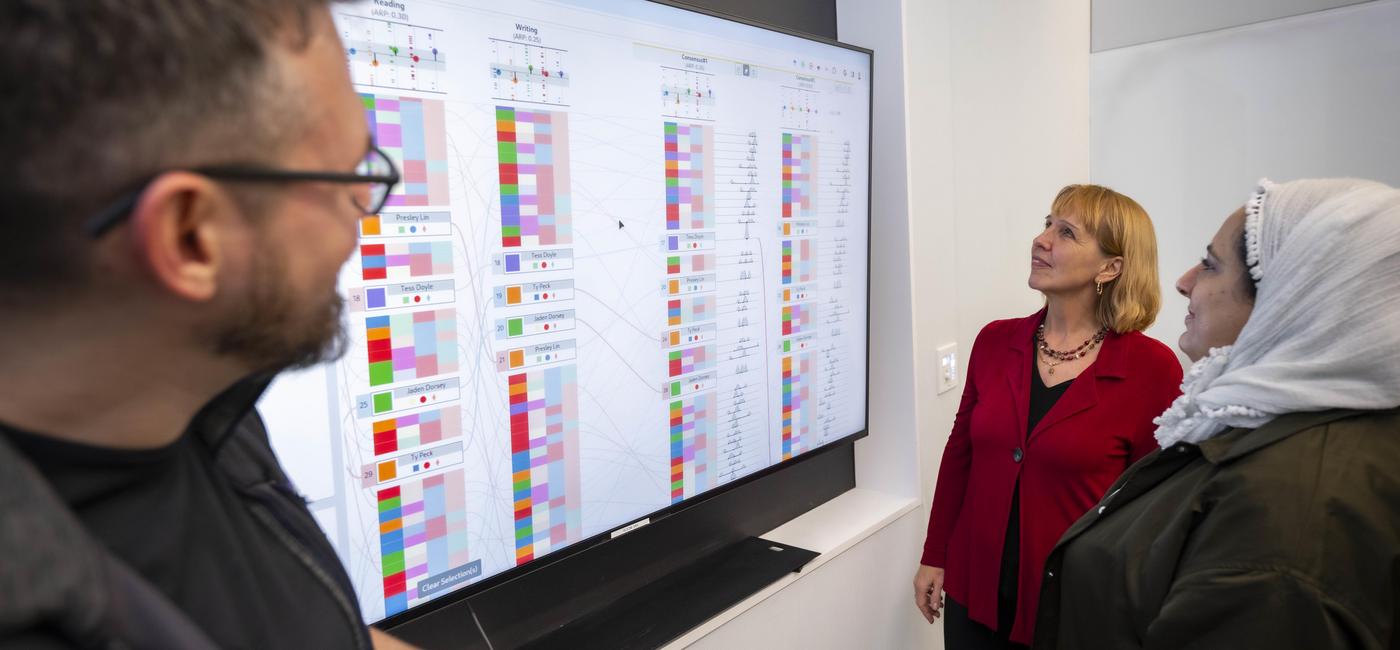Strengthen Your Data Science Skills. Advance Your Career.
A pioneering program, offered at WPI for 10+ years, the Master of Science in Data Science degree prepares you to derive new insights from data and articulate these findings into innovative solutions for how we live, work, and interact with the world around us. Your expertise will be in high demand in the workplace, as you tackle some of the world’s greatest challenges.
In this graduate-level program, you’ll build your core data science skills, ranging from data processing, statistics to the latest methods in Artificial Intelligence and Machine Learning. As an interdisciplinary degree, you’ll also have opportunities to develop interpersonal and data storytelling skills alongside technical mastery.
This program is also available online
Learn moreKey Program Information
Next Program Start: August 21, 2025
STEM-Designated: Yes
Modalities Offered: On Campus and Online
Program Highlights
- Deepen your in-demand skills sought by employers in cutting-edge data science and artificial intelligence courses from deep learning, machine learning, MLOPs, big data, reinforcement learning, generative AI, social media analytics, to natural language processing—including ChatGPT—and others across the campus.
- Use industry-leading tools including Pytorch, MySQL, Python, Matlab, Tableaux, Apache Spark, Oracle, and more
- Learn from world-class faculty who are scholarly and industry leaders in their fields working on cutting-edge projects in areas critical to our society.
- Work on real-world projects with industry partners. As part of WPI’s Graduate Qualifying Project (GQP), 500+ students have worked on 100+ projects
- Take advantage of bridge courses which allows for you to enroll without necessarily a specific technical undergraduate degree
- Benefit from our industry advisory board members who are actively invested in collaborating with our program faculty to ensure students are exposed to the latest trends in this dynamic industry sector
- Go beyond an MS degree with one-on-one directed studies or prepare to eventually pursue a PhD. WPI also offers a PhD in Data Science
MS in Data Science: Facts & Figures
U.S. college with a Master’s in Data Science program preparing students for high-paying, future-proof careers
best online master’s in data science
best national university
Career Outlook + Opportunities
$122,539
Example Jobs
Data Scientist, Data Architect, Machine Learning Engineer
36%
Employers of WPI Grads
Fidelity Investments, Microsoft, TJX Companies and more (WPI Career Development Center)
MS in Data Science: Career Outcomes
What does a career in Data Science look like? Browse WPI and national data to learn more about companies who have hired WPI graduate, average salaries, job outlook, and more.
Curriculum
The Master of Science in Data Science program begins with a foundational track required for students without appropriate math and/or programming experience. WPI’s data science master’s program is interdisciplinary, drawing from Computer Science, Mathematical Sciences, and the Business School. This trifecta of disciplines forms the basis for the program’s curriculum that focuses on:
- Data processing: extracting and managing data using traditional and cutting-edge big data systems
- Modeling techniques: Artificial Intelligence and machine learning algorithms
- Statistical analysis: A deeper knowledge of statistics and other applied mathematical foundations
- Data-intensive software: a rich diversity of software tools used throughout the program
- Essential management and leadership skills: business courses provide a holistic approach to data science, developing interpersonal and story-telling skills alongside technical mastery
Make the Most of Your WPI Experience
Current WPI students, even those whose undergraduate degree is not in computer science, may explore a BS/MS program option to gain both degrees in an accelerated plan.
Program Requirements
The data science degree requires the completion of 30 graduate credit hours. The distribution of credits is as follows:
Courses
Preparatory Courses (optional)
- Two courses are designed as ramp up courses for students who may lack sufficient background in either statistics or programming, respectively. They can count towards the 30 credits of the DS MS degree. They are:
- MA 511. Applied Statistics for Engineers and Scientists
- CS 5007. Intro to Applications of CS with Data Structures and Algorithms (Programming for non-CS majors)
Integrative Data Science (3 credits)
- DS 501: Introduction to Data Science
Mathematical Analytics (3 credits)
- DS 502/MA 543 Statistical Methods for Data Science
- MA 542. Regression Analysis
- MA 554. Applied Multivariate Analysis
Data Access and Management (3 credits)
(Choose one of the suggested courses below)
- CS 542 Database Management Systems
- MIS 571 Database Applications Design and Development
- CS 585/DS 503 Big Data Management
- CS 561. Advanced Topics in Database Systems
Data Analytics and Machine Learning (3 credits)
(Choose one of the suggested courses below)
- CS 548 Knowledge Discovery and Data Mining
- CS 539 Machine Learning
- DS 504 Big Data Analytics
- DS 541 Deep Learning
Business Intelligence and Case Studies (3 credits)
- MIS 584 Business Intelligence
- MKT 568. Marketing Analytics
- MIS 587. Business Applications in Machine Learning
Electives (12 credits)
- Students have access to additional cutting-edge courses in Data Sciences and Artificial Intelligence, ranging from Deep Learning, Generative AI, Natural Language Processing, MLOPS, Algorithms, Multi-Variate Statistics, AI for Business Applications, and many more.
- A complete listing of all courses pre-approved as electives for the MS in data science program may be found in the WPI Graduate Catalog under Data Science.
Capstone Project or Research Experience: Graduate Qualifying Project (GQP) (3 credits) or a MS Master’s Thesis (9 credits)
- The MS in data science culminates in the three-credit Graduate Qualifying Project (GQP), DS598, a semester-long team project with an industry partner, or
- A nine-credit M.S. thesis in supervision with a faculty member.
View additional degree requirements.
To find the next offering of Data Science courses, visit the Registrar’s site.
To view the description of the wide option of courses available to you across multiple departments, visit the Graduate Catalog.
Data Science Degree Options
- BS in Data Science
- MS in Data Science (This degree)
- PhD in Data Science
- Graduate Certificate in Data Science
WPI offers a range of options to earn your degree in data science at various levels of study. Prefer to pursue your master’s degree in data science online instead? Explore our flexible online MS in data science. Maybe you’re looking for expert proficiency in data science? Our interdisciplinary PhD in data science enables you to gain the leadership edge to elevate your career. In addition to our online MS and PhD, we offer a six-course certificate in data science. This is tailored to students who want to learn how to analyze and interpret data without fulfilling the demands of a data science master’s.




The WPI Difference
At WPI, we teach data science through a lens of theory and practice—and our department is actively innovating new models and solutions. As a data science master's student, you’ll work alongside faculty and researchers who are fueling breakthroughs that have direct, real-world impact in health, genetic analysis, sustainability, educational software, financial trading, and more.
Whether your research interest is using predictive analytics to identify cyber threats or empowering “smart” cities to make data-driven policy changes critical for societal well-being, WPI has the capacity to help you design and complete your master’s degree in the burgeoning field of data science.
The Data Science Innovation Lab is dedicated workspace for project work by students in the Data Science program. Robust servers and computer clusters are available for experimenting with large-scale datasets and compute-intensive generative modeling techniques throughout labs at WPI, including many interdisciplinary facilities.
What Can I Do with a Master’s in Data Science?
Data Scientist
- 15% job growth from 2019 to 2029
- $122,840 national average salary
In-demand skills:
- Distributed computing
- Predictive modeling
- Math, stats, machine learning
Source: U.S. Bureau of Labor Statistics
Data Analyst
- 6% job growth from 2019 to 2029
- $88,550 national average salary
In-demand skills:
- Spreadsheet tools
- Database systems
- Communication & visualization
Data Architect
- 10% job growth from 2019 to 2029
- $97,350 national average salary
In-demand skills:
- Data warehousing solutions
- Database architecture
- Systems development
Data Engineer
- 10% job growth from 2019 to 2029
- $93,750 national average salary
In-demand skills:
- Database systems
- Data modeling & ETL tools
- Data APIs
Business Analyst
- 7% job growth from 2019 to 2029
- $90,920 national average salary
In-demand skills:
- Data visualization tools
- Business intelligence
- Data modeling
Database Administrator
- 10% job growth from 2019 to 2029
- $93,750 national average salary
In-demand skills:
- Backup & recovery
- Data modeling & design
- Database systems
DS - AI Faculty Research
Faster, Fairer, and More Accurate AI Models with Graph Data
WPI Prof. Fabricio Murai discusses their current research related to FRV AI.
Extracting Knowledge with Natural Language Processing
WPI Prof. Kyumin Lee describes his research information retrieval and AI.
Better Data for Better AI Results
WPI Prof. Roee Shraga describes his work to improve the data used b AI systems and algorithms.
Understanding Brain Networks using Deep Learning
WPI Prof. Xiangnan Kong discusses their current research related to AI.
Featured Faculty





Take the First Step Today
Receive information about enrolling in WPI’s MS in Data Science or start applying for the program.
Have questions?
WPI's dedicated graduate student support team can help.

